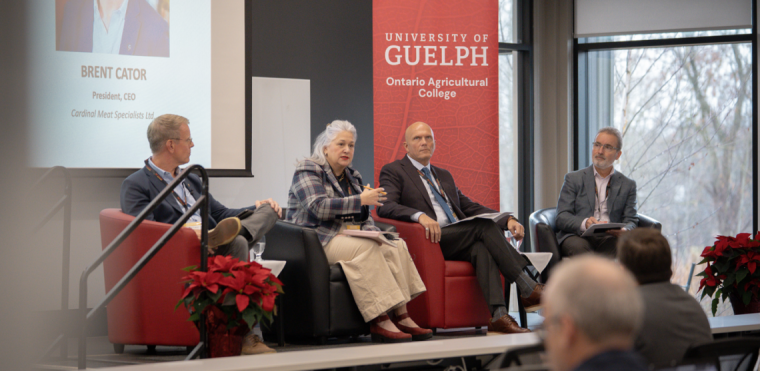
Dr. Ming Fang [5]
Dr. Fan’s core expertise is in the area of gastrointestinal physiology, nutrition and metabolism in pigs. His research focuses on understanding how nutrients affect physiological functions, wellbeing and health.

As global demand for protein increases and competition intensifies, Canada faces a critical question: how can we become a leader in protein innovation?
To solve this challenge, the Ontario Agricultural College (OAC) recently brought leaders from some of Canada’s largest protein companies to campus for a focused conversation on the future of protein. The goal of the event was to connect business, government and research partners to help position Canada as a global leader in the growing market.
“Protein demand is outpacing what today’s systems can deliver. For Canada to stay competitive, we need to work together and build a science-based understanding of the entire protein ecosystem. That’s how we set global standards, anticipate industry shifts, and train the workforce that will drive this sector forward.”
-interim associate dean of external relations Dr. Christine Baes.
The event opened with remarks from Dr. John Cranfield, dean of OAC.
“The world is making billion-dollar decisions about protein every day, and Canada needs to be in the position to provide clarity and solutions,” says Cranfield. “U of G has the expertise and innovation network to help lead in this space, but we need to bring it together in a more coordinated way.”
Executives from Canada’s largest protein companies took part in a panel discussion that examined the pressures and challenges facing the sector. Panelists Doug Alexander of Belmont Food Group [1], Brent Cator of Cardinal Meat Specialists [2], and Kathleen Sullivan of Maple Leaf Foods [3] discussed the challenges of meeting evolving consumer expectations, the opportunities and pressures within the protein sector, the value of shared learning, and the potential for innovation in areas such as data management and packaging.
As protein demand grows, so do the opportunities to innovate. Not only for new protein products and sources, but also for surrounding areas such as environmental assessments, economic impacts, and overall food systems, areas where U of G’s broad expertise can make a significant contribution.
“U of G researchers are driving advances in all aspects of agri-food. There is active research in everything from animal genetics through food safety technologies to new protein alternatives,” says Baes. “Partnering closely with industry will ensure this expertise delivers real-world impact.”
Conversations during the event pointed to a need for more collaboration between industry, government and academia to strengthen protein research and innovation. Cranfield adds that a collaboration “could evolve into a protein-focused institute at U of G, supported by industry and act as a connection point for Canadian protein innovation.”
“A potential protein institute could provide the science-based evidence companies need to inform competitive development and allow researchers to coordinate more strategically.”
-Dean of OAC John Cranfield
Baes added that a protein institute could build on existing strengths and capacity through the Ontario Agri-Food Innovation Alliance between U of G and OMAFA, including research stations owned by Agricultural Research and Innovation Ontario, an agency of the Government of Ontario.
Baes pointed to the Dairy at Guelph [4] initiative as an example of how coordinated partnerships work on campus and noted the growing momentum for a similar model focused on protein.
“A future protein institute could connect industry partners in a way that would strengthen the entire sector,” says Baes.
Throughout the day, it became clear that industry leaders shared a sense of urgency.
“With global protein markets evolving quickly, Canadian companies need clarity, consistent standards, and the ability to make informed decisions that support innovation without compromising safety or sustainability,” says Cranfield.
Bringing together senior leaders from the meat protein sector , as well as many other industry representatives with government officials and U of G’s research community allowed participants to imagine how Canada could move from reacting to global shifts to actively shaping them. The event concluded with a tour of the U of G meat lab and Centre for Meat Innovation Technology (CMIT).
By the end of the event, one takeaway stood out. The University of Guelph and OAC are building momentum to help position Canada as a global leader in protein innovation.
“Protein is tied to food security, sustainability, economic growth, and public trust and Canada needs a central source of reliable data and expertise. U of G is ready to help fill that role,” says Cranfield.
Below are just some of the OAC faculty that have expertise in protein.

Dr. Fan’s core expertise is in the area of gastrointestinal physiology, nutrition and metabolism in pigs. His research focuses on understanding how nutrients affect physiological functions, wellbeing and health.

Dr. Corradini’s [6] research focuses on the development of novel techniques to study foods, their biophysical behavior, and stability. She couples these techniques with predictive tools and computational methods

Dr. Rajcan [7]is involved in breeding soybeans to develop new high-yielding, high quality and disease resistant cultivars for the short- and medium-season soybean growing areas of Canada